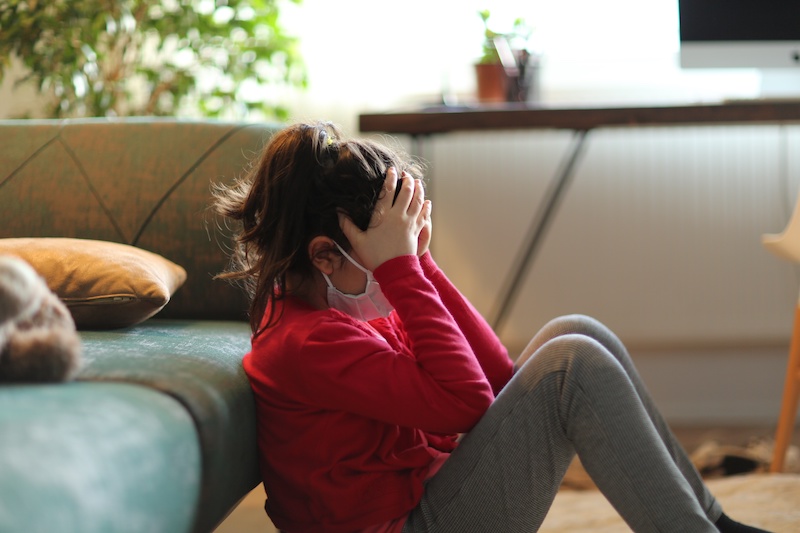
Photo courtesy of Getty Images
As a psychologist within the Obsessive-Compulsive and Anxiety Disorders Program at Texas Children’s, I work extensively with preschoolers, children and adolescents who struggle with obsessive compulsive disorder, panic disorder, social anxiety, separation anxiety, specific phobias and generalized anxiety. I help children and their families understand anxiety and learn to practice brave behaviors.
Anxiety is a normal reaction to many different events and situations in our lives. Anxiety is not always a bad thing. For adults and children alike, feeling anxious can motivate us to meet deadlines for school or work projects, or even studying for a final exam. It can alert us to potentially dangerous situations so we can better assess and respond to these events appropriately. While experiencing anxiety is normal, it can be a problem when it becomes overwhelming, unmanageable and interferes with regular daily activities.
As we recognize Mental Health Awareness Month, I thought this would be a great opportunity for me to answer your questions about anxiety – what it is and when to seek professional help.
What is anxiety?
Anxiety is a feeling that all people experience. You may think of the movie Inside Out from 2015 (produced by Pixar Animation Studios and distributed by Walt Disney Studios Motion Pictures). While our children are hopefully aware they do not have actual characters in their head, all people experience a variety of emotions, such as happiness, sadness, anger, disgust and fear/anxiety. It’s also pretty common to experience multiple feelings at once. Anxiety is usually described as worry or nervous anticipation about something. As with other emotions, anxiety may be accompanied by physical feelings, such as increased heart rate, stomach aches, sweatiness, headaches or muscle pains. Anxiety is an important feeling to have for success and safety. If we do not feel a little anxious about tests or presentations, then we may not study and would perform poorly. Similarly, we want to experience anxiety in dangerous situations in order to keep us safe.
Does my child have anxiety?
Of course! Everyone should be able to experience anxiety, and anxiety around certain events is normal. For example, young children usually feel anxious when they are separated from their parents. Older children usually feel nervous before big tests, on the first day of school, if they have to give a class presentation, or when receiving an injection or blood test. Older children may also be a little anxious about the future, the world, or the wellbeing of themselves, friends and family members. However, sometimes children and teenagers experience more anxiety than is usual or helpful. If this anxiety results in avoidance or gets in the way of doing things they enjoy or should be able to do, this may be evidence of an anxiety disorder. For example, it is usual to feel nervous going to school at the beginning of the school year. However, if your child experiences high anxiety every morning for weeks to months by trying to stay home each morning, crying on the way to school, or complaining of frequent aches and pains, this may mean they are experiencing more anxiety than is normal and helpful.
What can I do to help my child when he/she is experiencing too much anxiety?
You can encourage and support your child to participate in activities or events that cause them anxiety. For example, you can say a supportive statement such as, “I know STAAR is stressful, and I also know you will try your best and can do it.” Generally, letting your child avoid situations that cause them anxiety (such as staying home from school) usually makes anxiety grow over time even though your child may feel better in the moment. Spending too much time reassuring your child about a situation may also accidentally cause anxiety to increase. For example, if you spend 20 minutes preparing your child for an upcoming event, they may have been too anxious to remember exactly what you said, but they will remember you talked about it for a long time. This leaves the message that it must be a “big deal” and they should feel anxious about it. Try to keep information short and brief, and encourage your child to challenge their fears. Also, praise and reward your child when they act bravely!
Does my child need professional help with anxiety?
If anxiety is getting in the way with part of your child’s routine or functioning, such as keeping them from attending school or interacting with friends, or if your child’s anxiety results in high distress, additional help may be needed. You can talk to your child’s pediatrician about whether additional help may be beneficial. Additional help may involve behavioral intervention (therapy) and/or medication. The best type of therapy for anxiety is called cognitive behavioral therapy (CBT) which helps children and their families learn about the relation between thoughts, feelings, and behaviors. CBT should involve learning specific skills that are practiced between meetings and specifically practicing in situations that cause anxiety. Therapy should also incorporate parents so that parents can help support the child at home.
Click here to learn more about Texas Children’s OCD and Anxiety Disorders Program dedicated to providing high quality, family center and individualized care for children and adolescents.



